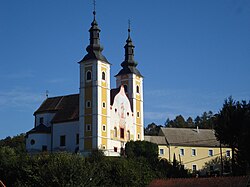Štrigova
| Štrigova | |
|---|---|
| Municipality | |

Church of Saint Jerome
|
|
| Location of Štrigova in Croatia | |
| Coordinates: 46°30′N 16°17′E / 46.500°N 16.283°ECoordinates: 46°30′N 16°17′E / 46.500°N 16.283°E | |
| Country |
|
| County | Međimurje |
| Government | |
| • Municipal mayor | Stanislav Rebernik |
| Area | |
| • Total | 39.31 km2 (15.18 sq mi) |
| Population (2011) | |
| • Total | 2,766 |
| • Density | 70/km2 (180/sq mi) |
| • Village | 443 |
| Time zone | CET (UTC+1) |
| • Summer (DST) | CEST (UTC+2) |
| Postal code | 40312 Štrigova |
Štrigova (German: Stridau; Hungarian: Stridóvár) is a village and municipality in Međimurje County, in northern Croatia.
The village of Štrigova is located 19 kilometres north-west of Čakovec, the seat and largest city of Međimurje County, and approximately two kilometres south-east of the border crossing with Slovenia in Razkrižje.
In the 2011 census, the municipality had a population of 2,766 in 10 villages. A total of 2,593 people living in the municipality identified themselves as Croats during the census. Although Štrigova is the seat of the municipality, it was only the third-largest village in the municipality during the census, with Sveti Urban and Železna Gora having higher populations. The 10 villages in the municipality, with their populations in the 2011 census, are:
The municipality covers an area of 39.31 km2. The area of the municipality covers a major part of the so-called Upper Međimurje (Croatian: Gornje Međimurje), which is a hilly region largely covered with forests and vineyards. The village of Štrigova is located 202 metres above sea level.
The economy of the municipality is largely focused on its agriculture. Many hills in the municipality were planted with vineyards and the production of wine is a major business in the municipality. There are many wine cellars throughout the municipality, most of which are privately owned, but there is also a large communally-owned wine cellar in Štrigova.
Cattle breeding and dairy products are also an important part of the economy of the municipality, although to a lesser extent in comparison with the production of wine, as well as rural tourism.
...
Wikipedia

